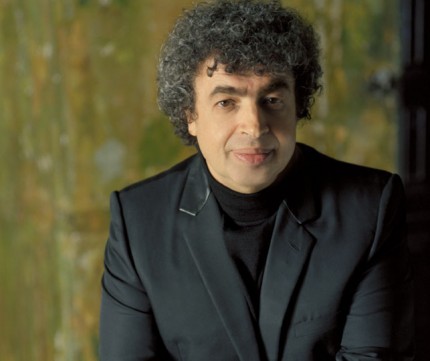Bychkov, Gerstein ignite a fire with CSO in Walton and Prokofiev

Say what you will about the program and the performances Thursday night at Symphony Center, it was not for the faint of heart. If Semyon Bychkov, the Chicago Symphony Orchestra, and pianist Kirill Gerstein couldn’t stir your blood in this program of Prokofiev and Walton, you might do well to check your pulse.
The CSO hasn’t maintained a special connection with the music of William Walton, and none of its music directors have programmed his music with any frequency. Curiously, his Symphony No. 1 received its American premiere in 1936 in Orchestra Hall under the baton of Sir Hamilton Harty, the same maestro who pestered the composer to undertake the commission, and led the world premiere with the Hallé Orchestra the previous year. The composer himself conducted the CSO in the symphony in 1963, but the work hasn’t been heard at Orchestra Hall since 1978.
Bychkov has tamed this beast often in recent years, so he was a logical choice to dust it off Thursday for an eager audience. Sensing that the work plays to their particular strengths, the players dug into the burley score with relish, while the conductor wisely didn’t try to sugar-coat the symphony’s unrelenting bombast. The single demerit that kept the performance a shade below the top shelf was the absence of several wind principals, and uneven playing from some of their subs.
After a few minutes of build-up that uncannily conjured the spirit of Sibelius, the maestro kept the interminable but thrilling brass climaxes just below the pain threshold. Balances were well-gauged for the most part (no easy feat given Walton’s clogged orchestration), and the horn trills in the first movement were a special treat. The maestro coaxed a sizzling level of intensity from the strings, all of whom deserve high marks for mastering a demanding score that most were playing for the first time.
The second movement (Presto, con malizia) snarled and spat, a vivid evocation of Walton’s well-documented caustic affair with the Baroness Imma von Doernberg. The orchestra kept the textures barely distinctive enough to reveal a kinship with Holst, though the sprit of Beethoven was never far below the surface.
Bychkov didn’t quite make the case for the work as an unqualified masterpiece, but he teased out so many pleasures (many guilty) one hopes management doesn’t wait another 35 years for the next go-around.
It’s hard to believe that a mere 20 years ago relatively few pianists dared to include Prokofiev’s Piano Concerto No. 2 in their repertoire. Far more have since delved into its thicket of technical hurdles and interpretive mysteries, and Kirill Gerstein’s probing and
memorable account Thursday deserves to be included among the finest.
There were times when more emphatic punctuations were needed to boost the drama and underline the demonic recklessness that seems embedded in the score. Yet it soon became clear that the soloist was holding some vitriol in reserve for the finale. He launched into the opening bars with a breakneck pace and ferocious intensity, maintaining a searing intensity till the final bars.
But it was Prokofiev’s remarkable cadenzas that left the strongest impression. The massive first movement cadenza is among the most difficult ever penned, and swallows nearly half the length of the movement. Not satisfied with simply ripping through each terrifying gesture, Gerstein lured the listener’s attention to more introspective passages, voicing the chords to emphasize knotty dissonances, yet releasing them with a sensitive touch that was nearly impressionistic in effect.
Regarding the technical scorecard, Gerstein deserves high marks, save a few blemishes on high notes after rapid ascending passages. The second movement moto perpetuo was a wonder, though Bychkov could have brought his forces down to make the pianist’s churning more audible.
The program will be repeated 8 p.m. Friday evening. cso.org; 312-294-3000.
Posted in Performances





Posted Oct 26, 2013 at 12:34 pm by Frank Monnelly
The Walton Symphony No. 1 is a favorite of mine, alas, only from recordings. I agree that once in thirty five years is too long a wait.
The first movement is aptly used in Kenneth Clark’s Civilization. (The final episode Heroic Materialism) It accompanies an aerial trip down the East River. The helicopter travels under the Brooklyn Bridge and along the skyscrapers of lower Manhattan. The music lends an ominous feeling to the visual. It underscores Clark ‘s view of where Civilization has arrived.
Posted Oct 27, 2013 at 12:47 am by Odradek
“Walton Symphony No. 1 is a favorite of mine” – mine too. I just came back from the Saturday concert. Two examples of mainstream modernism at its best. Rip-roaring performances, and the audience loved it.
Posted Oct 28, 2013 at 2:52 am by Hank Browne
I disagree on two levels about the wind playing. First, I think only the putative principal clarinet was missing. Instead, I think that was Jonathan Gunn, who had performed with the CSO in the past, was the sub. I like his play and I think it is pretty much up to a level with Williamson. Gunn is the acting principal at Cincinnati Symphony. Otherwise, I think that the principal flute, oboe, English and bassoon were all in attendance (although, I was sitting much higher up than usual–I may be mistaken). The other clarinet player seemed to be Bloom, a very fine musician, who is the usual bass clarinet player in the CSO.
Posted Oct 28, 2013 at 1:28 pm by Helen
Unfortunately, it is painfully obvious when Matthieu Dufour is present and when he is not, and that was in evidence Thursday during the 3rd movement of the Walton symphony.